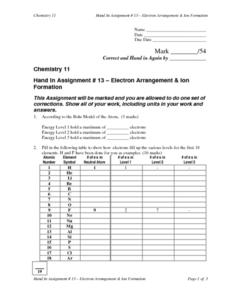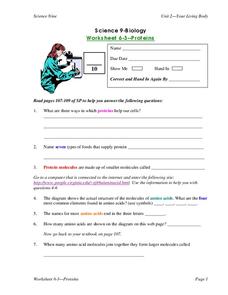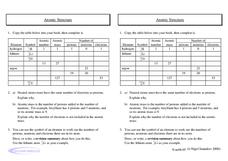Curated OER
Animal Symmetry and Phyla
In this animal kingdom worksheet, students complete a graphic organizer by writing in the phylum and body symmetry for the 12 animals listed.
Curated OER
Arthropods
In this arthropods worksheet, students complete a graphic organizer by reading characteristics of the different classes or subphylum and writing in examples for each of these groups.
Curated OER
Atomic Structure
In this atom worksheet, students define the atomic theory, compare an atom and a molecule, determine atomic number and number of protons for elements, and draw Bohr models for given elements. This worksheet has 4 graphic organizer, 8...
Curated OER
Electron Arrangement and Ion Formation
In this elements worksheet, learners determine how electrons fill up the energy levels for the first 18 elements of the periodic table. Students determine if elements gain or lose electrons to form a stable ion. This worksheet has 4...
Curated OER
Fats
In this fats worksheet, students review what fats are made up of, where fats come from, and how our body uses fats. Then students access a website to compare good fats and bad fats. This worksheet has 1 graphic organizer, 13 short answer...
Curated OER
Proteins
In this proteins worksheet, students name the types of foods that supply proteins and determine how the body uses proteins. Students understand how to acquire complete proteins. This worksheet has 1 graphic organizer, 9 short answer, and...
Curated OER
Fish Comparison - Appearance
In this fish worksheet, students complete a graphic organizer by comparing and contrasting the physical appearance of 10 different fish.
Curated OER
Graphing Data Chart
In this fish data worksheet, students complete a graphic organizer by writing in the maximum length and maximum weight for 13 different fish.
Curated OER
Survivor
In this animal worksheet, students read a portion of a website to complete a graphic organizer explaining how 7 different animals adapt to deal with winter climate.
Curated OER
Fish Spawning Comparison
In this fish worksheet, students complete a graphic organizer by writing in when, where, and how 10 different fish lay their eggs.
Curated OER
Insect Comparison
In this insect worksheet, students complete a graphic organizer by researching the 10 different insect orders. Students draw a picture and then write examples and physical descriptions of each of the orders.
Curated OER
Water Quality
In this water quality worksheet, students complete a graphic organizer by understanding pH, temperature, oxygen, and turbidity as it relates to ideal water conditions.
Curated OER
Lake Formation and Features
In this lakes worksheet, students list the 5 ways lakes fill with water. Students complete a graphic organizer by describing the 3 kinds of places where lakes form.
Curated OER
Seasons of a Lake
In this lake worksheet, students access a website to read about how the conditions in a lake change during the seasons. Students write these changes in a graphic organizer.
Curated OER
Clues to Copying the Code
In this DNA worksheet, students access a website to determine the information that was used to understand DNA replication. Students compare the difference between observations and opinions. This worksheet has 7 short answer questions and...
Curated OER
Trends in Physical Properties of Group 2 Elements
In this elements learning exercise, students complete 2 graphic organizers by comparing the element symbol and melting point for given elements. Then students plot a graph of their atomic radius against proton number.
Curated OER
Salts
In this salts worksheet, students read how salts are created and how different acids make different salts. This worksheet has 1 graphic organizer and 7 short answer questions.
Curated OER
Reactions of Group 1 Metals With Water
In this elements worksheet, learners complete a graphic organizer comparing observations of lithium, sodium, and potassium. Then students determine how these elements react with water. Learners complete 3 fill in the blank questions.
Curated OER
Calculating the Number of Sub-Atomic Particles in an Atom
In this atoms worksheet, students compare the position, relative charge and relative mass of sub-atomic particles. Students define mass number and atomic number. This worksheet has 2 graphic organizers and 4 short answer questions.
Curated OER
Electron Arrangement
In this ions learning exercise, students complete a graphic organizer by filling in the successive ionisation energies for potassium. Then students create a graph plotting ionisation energy against the number of the ionisation energy.
Curated OER
Alkanes: Physical Properties
In this alkanes worksheet, learners complete a graphic organizer by filling in the number of carbon atoms for the given alkanes. Students plot a graph showing how physical properties change with the number of carbon atoms. Then learners...
Curated OER
Ionization Energies in Group I and Period 2
In this electron arrangement instructional activity, students complete 2 graphic organizers by determining the proton number of given elements from their first ionization energy. Students plot graphs of first ionization energy against...
Curated OER
Atomic Structure
In this elements worksheet, high schoolers complete a graphic organizer by filling in the element symbol, atomic number, atomic mass, and the number of protons, electrons, and neutrons. Then students complete 2 short answer questions.
Curated OER
Subatomic Particles
In this atoms worksheet, students complete a graphic organizer comparing the properties of the 3 subatomic particles. Then students complete 1 short answer question.

























